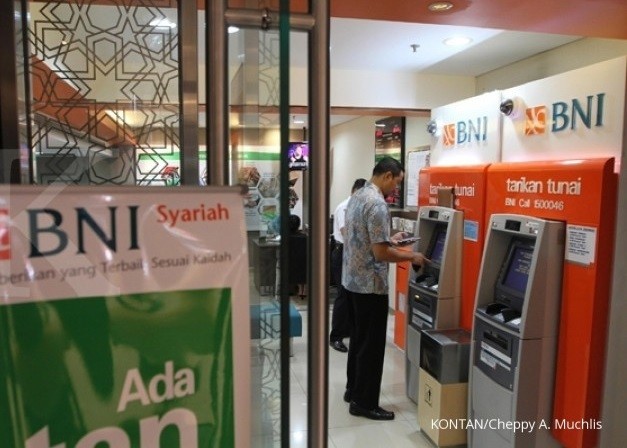
BNI Syariah sees profit soar in Q1, chances to expand international banking services
by Yunindita PrasidyaBNI Syariah, the sharia subsidiary of state-owned Bank Negara Indonesia (BNI), reported a jump in its net profit during this year’s first quarter as it eyed opportunities to expand international banking services by banking on its parent company’s overseas branches.
BNI Syariah net profit soared 58.1 percent year-on-year (yoy) to Rp 214 billion (US$14.46 million) in the first quarter of the year as the adverse impacts of the COVID-19 pandemic had yet to hit the bank’s bottom-line as of March, president director Abdullah Firman Wibowo said.
“However, we have anticipated its impacts in the next quarter, both on the business front as well as on the assets quality side. We hope these impacts can be minimized so that we can still make a profit,” he added during a livestreamed press briefing on Thursday.
The coronavirus outbreak is expected to hit the banking industry as it disrupts business activities and forces millions of people out of job, battering loan demand and jeopardizing credit repayments.
BNI Syariah recorded a 9.8 percent growth in financing disbursement to a total of Rp 32.32 trillion while its non-performing financing (NPF) rose to 3.8 percent from 2.9 percent during the same period last year. Between December 2019 and March 2020 alone, NPF climbed by 47 basis points.
“We will try our best to manage the [NPF] to remain at a level below 4 percent, hopefully even below 3.5 percent,” Firman said.
BNI Syariah reported that its third-party funds (DPK) grew 16.58 percent to Rp 44.86 trillion, with current accounts and savings accounts (CASA) dominating the DPK and making up 64.96 percent of the total.
Recently, BNI Syariah managed to enter the BUKU III category, which is a cluster of banks with core capital of between Rp 5 trillion and Rp 30 trillion. The bank’s core capital reached Rp 5 trillion as of March following an injection of capital in the form of asset handover worth around Rp 255 billion by the bank’s parent company, director of compliance Tribuana Tunggadewi said.
“As BNI Syariah becomes a BUKU III bank, it has the opportunity to optimize its international businesses,” Firman said, adding that the effort meant potential fee-based incomes of up to Rp 70 billion from trade finance and around Rp 20 billion to Rp 30 billion from remittance.
The company has offered several international banking services, such as international trade finance, remittance, letters of credit and export and import financing.
BNI Syariah could benefit from its parent company’s presence in six major cities across the globe, namely Singapore, Tokyo in Japan, Seoul in South Korea, Hong Kong, New York in the United States and London in United Kingdom, as the cities had a sizable Indonesian population and businesspeople with Indonesia-related businesses, Firman said.
As part of an effort to optimize the new business opportunities, the bank worked to increase its digital capacity and target the millennial market to tap into a bigger customer potential.
BNI Syariah finance and operations director Wahyu Avianto mentioned in the press briefing that during the pandemic, the bank was “reaping the rewards” of its digital programs that were initiated two years ago.
Among the bank’s innovations was the online account opening service, which saw a 136.86 percent increase between December 2019 and March 2020 to almost 25,000 accounts.
The bank has also been developing its sharia e-money called HasanahKu, which it claims to be the first of its kind, to support the growth of the halal ecosystem in the country.
Wahyu noted that the digital initiatives had led to an increase in third-party funds, and hence, its fee-based income.
“We hope in the future, they can help boost the growth of BNI Syariah’s profitability,” Wahyu said.